Russia 2010
St.Petersburg, Moscow, and places in between.
Many British people go to Russia nowadays, mainly on organised tours to St.Petersburg and/or Moscow. Independent travel is still fairly unusual, and having done it, I now know why. The aim of my brief visit was to find out what Russia is like, not the art galleries and museums, but the country. This is, of course, impossible. Russia is the largest country in the world, larger than Western Europe and the USA put together, with a 10-hour time difference from west to east and including many different cultures. In recent times the country has changed so fast that it is actually quite difficult to find out what it is really like without going there. Probably the best sources of information about Russia, past and present, are the Lonely Planet and Rough guides and Jonathan Dimbleby's book (based on the BBC TV series) "Russia, a Journey to the Heart of a Land and its People". He travelled in stages from Murmansk in the north to the far south, and then across to Vladivostok in the east, a total distance of 10,000 miles in 18 weeks.
My plan, in 9 days, was to fly to St.Petersburg and drive to Moscow and back, 450 miles each way, looking at large towns, small towns, villages and anything else that caught my interest on the way. Driving in Russia was likely to be exciting. Jonathan Dimbleby said that of the 80 countries he had driven in Russia was the one in which he felt most insecure, and before going he was given advice by an ex-SAS medical orderly who described the lurid consequences of a head on collision. Heads could be severed and hurled around the inside of a vehicle like clothes in a washing machine. Russian drivers had a rather perverse motto 'Die today because tomorrow you might live', but I still didn't think it could be worse than Albania.
Visa traumas
To go to Russia you have to a have a visa, and to get a visa you have to have an "invitation". Most people get their visas through their tour organisers, and have little idea of the procedure involved. If you don't have a tour organiser you have to get an invitation from an approved travel organisation with links to Russia, but it is really just a formality and a way of spending some money. I got my invitation on the internet through a firm called Real Russia, which has offices in London, St.Petersburg and Moscow. They will also arrange to get your visa for an extra fee, but I decided to do it myself, which may not have been very wise. The Russian embassy has sub-contracted its visa service to a private company, and you have to fill in the form on line. To do this you need a degree in Information Technology with ancillary Convoluted Thinking, and after about 2 hours I was on the point of giving up when it suddenly went through. I sent my passport to the Russian embassy with the printed-out form and it came back after a few days with the visa. The cost altogether was around £100.
Needless to say, it is not as simple as that because when you get to Russia you have to register your visa within 3 working days of arrival to give the authorities some degree of information about your movements within the country. The rules relating to visa registration are quite complicated and often poorly explained in guide books. If you are staying in a hotel the hotel should register your visa, but some cheap hotels make a charge or even refuse to do it. A lot of guide books say you must get your visa stamped every time it is registered but that system finished in 2007 and the hotel should now give you a standard form to prove your registration.
In fact, all the hotels I went to kept my passport for up to an hour after my arrival to register my visa, but only one gave me the proper form. When I raised this with a couple of the others they said "It's in the computer", and told me to show the police my payment receipt or room card if I was stopped.
If your visa expires while you are in Russia it can be a massive problem, because you cannot get accommodation without a valid visa, and might face a fine on leaving the country as well as difficulty in getting a visa in the future. Tourists whose visas expired while they were delayed due to the Icelandic volcano were ordered to remain in their hotels until they had new flights arranged, and that would obviously be difficult for an independent traveller. When I applied for my visa no one had thought of the volcano, and I only allowed 2 extra days beyond my return flight, but if the volcano blew up again I had a contingency plan to jump on a train to Tallinn in Estonia while my visit was still valid.
St.Petersburg
The flight to St.Petersburg was with Lufthansa via Dusseldorf, where I experienced the most stunning example of German inefficiency that it is possible to imagine. After going through immigration three times due to a last minute unannounced gate change I was the last person on the plane, which did not make me very popular, as it had been waiting 25 min.
At Pulkovo 2 airport in St.Petersburg there was a massive and badly organised immigration queue, and it took about an hour to get through, but the actual procedure for most people was quite quick, with no fingerprinting or other time-consuming checks.
When I came out of the terminal and looked around I was more fazed than I have ever been in any such situation before. Apart from a couple of advertising slogans, everything in sight was in Cyrillic characters. Now, this was Russia, and I suppose I should not have been surprised, but I was. When I was planning the trip I thought it might be useful to learn the Cyrillic alphabet, but I did not realise that for travelling around it would be essential. I had learnt to recognise the characters, but not most of the sounds associated with them, which made it difficult to memorise words.
Public transport from the airport to the city centre consists of a bus or mini-bus to Moskovskaya Metro (underground) station and then on by Metro. There was no sign of a bus, but a continuous supply of yellow mini-buses with the names of their stopping places in the window in Russian. I let the first one go, thinking it was a pirate taxi. After studying the list of stops on the next mini-bus I realised that Московская was Moskovskaya and got in. I paid the driver when everyone else did and just hoped I would know when to get off. In fact, the driver announced Moskovskaya very loudly when we reached the Metro station.
On the Metro there is a flat fare of 26r per journey, regardless of where you go, and in return for the money you receive a metal token. This sounds straightforward, but wasn't, and by the time I had got my token the lady in the ticket office didn't seem to like me very much. To complicate things my wheelie case was too big to go through the automatic gates, and a man came out of a little cabin shouting "Plastik, Plastik". It turned out that if you had a large item of luggage you had to have a plastic token that would open the wide gate at the end. This meant that I had to fight my way back against the crowd to the lady who didn't like me very much and ask for a plastic token instead of the metal one, causing her to like me even less. Russians are big robust people, and when they are in a hurry and you are in the way they let you know it.
Eventually I got to the platform, which was like an airport shuttle station, with a row of doors that open matching those on the train. I had to go 5 stops on one line and 3 stops on another, starting at Moskovskaya (Московская) and finishing at Mayakovskaya (Маяковская). This sort of thing is done, of course, quite deliberately to confuse foreigners. There were no station names visible from on the train, just a single, muffled announcement in Russian, so all I could do was count the stops and hope I had got it right. At the intermediate station, Tekhnologichesky Institut, I got out and was completely at a loss as to how to find the train to Mayakovskaya. After asking several people and getting nowhere I found a very nice young lady who spoke good English and was going to Mayakovskaya. This seemed too good to be true, but I suppose something had to go right, and when we got off the train she pointed me in the direction of my hotel.
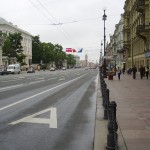 As always, I had booked the hotel on the internet and, as always, had chosen one of the cheaper ones, called Rinaldi at Nevski 105. Nevski Prospekt is the main thoroughfare in St.Petersburg and perhaps the most the most famous street in the whole of Russia. Most of it is very wide and lined with quality hotels and the big names from the purveyors of fine goods to the upper classes. My hotel was in the other part of Nevski Prospekt, on the downwind side of the railway station, and it proved to be rather hard to find. After a lot of confusion involving several helpful people it turned out that the hotel was in a yard like a mews behind no.105, and the entrance was a solid steel door with Rinaldi on a brass plate, and a numeric key pad underneath. All attempts at pressing buttons failed, until another helpful person rang the phone number on my booking confirmation and spoke to someone in the hotel. The number 2006 was given, and when put into the key pad the door clicked open. I thanked the helper and went in, to find myself facing 3 flights of crumbling shallow stone steps surrounded by peeling paint. This place had obviously not changed one iota since the Siege of Leningrad in 1941. On the first floor was another steel door with a bell push, which when pressed produced a muffled woman's voice saying something in Russian. All very John le Carré. I said my name and when the buzzer sounded I went through to find an immaculate and modern reception desk with a lady who spoke excellent English. It turned out that she taught English in a school some distance away, and was moonlighting (her word) during the holidays.
As always, I had booked the hotel on the internet and, as always, had chosen one of the cheaper ones, called Rinaldi at Nevski 105. Nevski Prospekt is the main thoroughfare in St.Petersburg and perhaps the most the most famous street in the whole of Russia. Most of it is very wide and lined with quality hotels and the big names from the purveyors of fine goods to the upper classes. My hotel was in the other part of Nevski Prospekt, on the downwind side of the railway station, and it proved to be rather hard to find. After a lot of confusion involving several helpful people it turned out that the hotel was in a yard like a mews behind no.105, and the entrance was a solid steel door with Rinaldi on a brass plate, and a numeric key pad underneath. All attempts at pressing buttons failed, until another helpful person rang the phone number on my booking confirmation and spoke to someone in the hotel. The number 2006 was given, and when put into the key pad the door clicked open. I thanked the helper and went in, to find myself facing 3 flights of crumbling shallow stone steps surrounded by peeling paint. This place had obviously not changed one iota since the Siege of Leningrad in 1941. On the first floor was another steel door with a bell push, which when pressed produced a muffled woman's voice saying something in Russian. All very John le Carré. I said my name and when the buzzer sounded I went through to find an immaculate and modern reception desk with a lady who spoke excellent English. It turned out that she taught English in a school some distance away, and was moonlighting (her word) during the holidays.
When I got sorted I went for a walk along Nevski Prospekt. It was Saturday evening and very busy, with a lot of people around including a considerable number in smart military uniforms. The traffic travelled at astonishing speeds in the stretches between the traffic lights, 50 or 60mph being not uncommon, and the many police, mainly in cars, did not take much notice. I was too tired to walk far, and on the way back I stopped at a fast food place for a 'large' jacket potato with a cheese filling. This was where I discovered that in Russia food portions are significantly smaller than in Britain, and downright tiny compared with the USA. The same applied to restaurant meals that I had subsequently, though the international standard hotels used by the tour companies would probably be more in line with western practice.
The hotel breakfast the next morning was unusual in that most of it came in a sealed paper bag, supplied by an outside firm like an airline meal. The main item was a packet of porridge, which the lady took and returned with hot milk added. There were also sachets of tea and coffee, butter, cheese, honey and various other bits and pieces. Toast came separately.
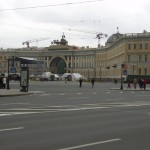 After breakfast I set off in the rain to look at St.Petersburg. As I said at the start, museums and art galleries are not my scene, and they are the subject of literally dozens of books and web sites that will leave you more breathless with wonder than any description that I could possibly provide. It was Peter the Great's intention to create a showpiece to impress the world with Russia's wealth and cultural achievements, and he undoubtedly succeeded in doing that, although it was at a high price in terms of human suffering. In the morning I decided to follow the Lonely Planet guide's walking tour of the Historic Centre, which takes in all the main sights, and gave myself a crash course in Cyrillic pronunciation on the way. With a population of 4.6 million St.Petersburg is a large city and has all the usual problems of such, but the famous historic area is actually quite small and has a concentration of stunning architecture that is probably unequalled anywhere.
After breakfast I set off in the rain to look at St.Petersburg. As I said at the start, museums and art galleries are not my scene, and they are the subject of literally dozens of books and web sites that will leave you more breathless with wonder than any description that I could possibly provide. It was Peter the Great's intention to create a showpiece to impress the world with Russia's wealth and cultural achievements, and he undoubtedly succeeded in doing that, although it was at a high price in terms of human suffering. In the morning I decided to follow the Lonely Planet guide's walking tour of the Historic Centre, which takes in all the main sights, and gave myself a crash course in Cyrillic pronunciation on the way. With a population of 4.6 million St.Petersburg is a large city and has all the usual problems of such, but the famous historic area is actually quite small and has a concentration of stunning architecture that is probably unequalled anywhere.
After 2 or 3 hours of this I decided to move into the real world and look at the Apraksin Dvor Market, which is sadly in the process of 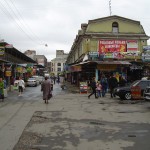 being revamped and turned into another modern shopping mall. This is a proper market where local people and tourists do their shopping amongst decaying buildings that apparently offend the sensibilities of the city fathers and also provide an opportunity for vast sums of money to change hands in the name of urban regeneration.
being revamped and turned into another modern shopping mall. This is a proper market where local people and tourists do their shopping amongst decaying buildings that apparently offend the sensibilities of the city fathers and also provide an opportunity for vast sums of money to change hands in the name of urban regeneration.
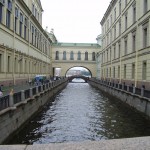 St.Petersburg has miles of canals, lined with fine buildings, including many of the major sights. In the afternoon I went on a one-hour canal boat tour with a commentary only in Russian. The lady in charge came round to collect the money before the boat set off, to ensure that she had got it before the passengers sitting outside were decapitated by the first low bridge.
St.Petersburg has miles of canals, lined with fine buildings, including many of the major sights. In the afternoon I went on a one-hour canal boat tour with a commentary only in Russian. The lady in charge came round to collect the money before the boat set off, to ensure that she had got it before the passengers sitting outside were decapitated by the first low bridge.
The next morning I set off for the airport to collect my car. By now I had realised that everything in Russia was more difficult than I could imagine, and that included finding the way into the Metro station. While I was searching around a little old lady came along with a big shopping bag in one hand and a bunch of flowers in the other. She wanted to help, so I somehow explained what I was trying to do, and she marched up to the OUT doors, forcing them back into the faces of the people trying to come through. When they complained she shouted at them and then at me for lagging behind as I struggled with my large wheelie case. This was repeated at another set of doors, and we emerged on the other side of the building, where she took me round to the entrance. Just one example of so many on this trip where people offered to help, and if anyone imagines that ordinary Russians are afraid of foreigners they could not be more wrong. Amazingly, the flowers survived.
At the airport I was not at all surprised to find that the Hertz Car Rental desk was unattended. I was supposed to collect the car at 11.00am, and by 11.15 there was still no one there. I asked the lady on the City Information desk opposite, and she offered to ring the number on my reservation form. The man who answered spoke good English, and said he would be outside in 3 minutes in a VW Transporter. Five minutes later a VW Transporter arrived driven by a extremely smart young man wearing a special Hertz tie that would be clearly visible from Outer Space, and he took me to their depot in an underground car park in the Trade Centre about ¼ mile away. It seemed to be taken for granted that somehow their customers would track them down, but it would have been so much easier with a notice on the airport desk explaining the situation and giving the phone number. I came across this kind of thing time and time again in Russia, and there seems to be a reluctance to put up signs or notices in any language providing essential information for strangers. Perhaps it goes back to the Soviet days and a desire to keep things secret.
On the road at last
The car was s Skoda Octavia with 290km on the clock from new. I would have preferred a proper Russian car like a Lada or Volga, but they are not reliable enough for the international rental firms. The next task was getting petrol, as the tank was almost empty, and that proved as difficult as everything else in Russia. You have to pay in advance (as in many other countries, including the USA nowadays) which was manageable, and the price was equivalent to about 60p per litre, far cheaper than at home. Making the pump work was another matter, and by the time I had finished messing about I had just about brought the whole place to a standstill. A lady came from the office and pointed out that there were 2 different types of 95 octane, and I had chosen the wrong one. I could only think one was leaded and the other unleaded. The lowest grade was 72 octane, and I can't imagine what you would put that in.
From St.Petersburg to Moscow is about 450 miles and there is only one direct road, the M10 'motorway'. My night stop was to be Novgorod, about 110 miles on the M10, but in this case there was an alternative route via the M20 motorway to a town called Luga and then an ordinary main road across country to Novgorod. This way was about 25 miles further, but looked more interesting.
The M20 was a rude awakening to Russian driving. At the start it was being upgraded and there were acres of tarmac with no markings at all, so you had to guess where the lanes were, which made no difference to the local drivers at all. After some distance it degenerated into a 2-lane single carriageway similar to an ordinary main road in Britain, and it was like that most of the way to Luga, a distance of about 70 miles. There was very heavy traffic, largely lorries, but I must admit that after a short time I started to drive like a Russian, overtaking with abandon in the face of oncoming traffic.
Luga is by-passed, and quite a pleasant little town, with tree-lined roads and a market, and I turned off here on to the P47 to Novgorod. 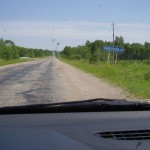 The first 40 miles was an old concrete road that was rather like a net, entirely covered with pot holes a few inches across. At 40 - 50 mph the car just thumped along, and there was no other traffic apart from an endless number of orange Kamaz (or Kamaз) trucks, carrying aggregates from a quarry.
The first 40 miles was an old concrete road that was rather like a net, entirely covered with pot holes a few inches across. At 40 - 50 mph the car just thumped along, and there was no other traffic apart from an endless number of orange Kamaz (or Kamaз) trucks, carrying aggregates from a quarry.
Novgorod
Now, we are talking here about Velikij Novgorod, not the much larger industrial city of Niznij Novogorod, about 400km east of Moscow. Velikij Novgorod, usually just known as Novgorod, is an old city in origin, much older than St.Petersburg, and was at one time the effective capital of Russia. Before the Second World War it had some fine buildings, but was almost entirely flattened by Hitler, though some of it was rebuilt in something like the original style.
Unfortunately, when they rebuilt it they didn't put the names back on the streets, which caused a considerable problem to me when I arrived. I had booked a room at the Hotel Intourist, described by the LP guide as "this old Soviet stalwart", which sounded ideal. Intourist was the name of the state travel organisation during Soviet times, which controlled the movements of all tourists in Russia. Once I realised that I was definitely lost, which didn't take long, I stopped in the entrance to an industrial site and asked a young bloke who had his head stuck under the bonnet of an old Lada. He did not know where the hotel was, and his very fed-up looking female companion did not know either. I would imagine that the female companions of the owners of old Ladas are fed-up a fair amount of the time. After a lot of consideration he rang the hotel on his mobile and they told him where they were. He indicated that I should follow him, and once he had got the car sorted we set off on a nerve-wracking drive through the rush-hour traffic. In a few minutes we arrived at the Intourist, and I thanked him profusely, something that I seemed to spend a lot of time doing in Russia.
The Intourist had a huge mural of Mother Russia above the entrance, a relic of Soviet times, but had pleasant English-speaking staff and was actually quite all right. Once I got my passport back after the visa registration ceremony I set off on foot to look round the town and get something to eat. Almost next to the Intourist was a wonderful example of post-war modernist architecture in the form of a theatre 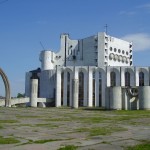 built of concrete with white marble cladding. Much of the marble has gone, taken, I understand, by local people for home improvement, but the general style of the building could perhaps best be described as interesting. Apparently it was designed by three architects, and one might be forgiven for thinking that they had no communication with one another.
built of concrete with white marble cladding. Much of the marble has gone, taken, I understand, by local people for home improvement, but the general style of the building could perhaps best be described as interesting. Apparently it was designed by three architects, and one might be forgiven for thinking that they had no communication with one another.
The weather was very hot and somehow I missed the road that led to the city centre, with the result that I was almost dying of exhaustion when I finally found a restaurant. The staff did not speak English, there was no English menu, and in fact I got the impression that I was the first foreign customer they had ever had. Eventually it was agreed that I would have shashlik because it was the only dish known to everyone involved, and it turned out to be quite a good meal.
Suitably refreshed I retraced my steps as far as the river and came across the World War II Monument, which has a kind of stark, brutal, 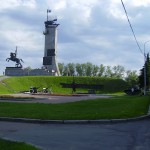 hardness that could only be Russian. Nearby was a beach, crowded on a warm evening, and next to it the Kremlin. Kremlins are not unique to Moscow, as the word means fortress. Although it dates back to the 14th century I found it rather disappointing, but in the middle is the Millennium Monument, a 19th century sculpture 16m high, incorporating 129 figures of notable Russians. Hitler ordered it to be taken to Germany and had it cut up for transport, but fortunately the Germans were kicked out before they had time to move it.
hardness that could only be Russian. Nearby was a beach, crowded on a warm evening, and next to it the Kremlin. Kremlins are not unique to Moscow, as the word means fortress. Although it dates back to the 14th century I found it rather disappointing, but in the middle is the Millennium Monument, a 19th century sculpture 16m high, incorporating 129 figures of notable Russians. Hitler ordered it to be taken to Germany and had it cut up for transport, but fortunately the Germans were kicked out before they had time to move it.
In St.Petersburg I had noticed that the traffic noise seemed to go on all night, and it was the same in Novgorod. As the days passed on this trip I realised that the Russians, like the Americans, never seem to sleep, and many businesses are open 24 hours, which I found quite surprising. There is also less Sunday observance than in Britain or many other western countries.
The M10 to Vyšnij Voloček and Tver
After a comprehensive but uninspiring buffet breakfast I set off for the long journey on the M10 'motorway' to Tver, a town about 100 miles north of Moscow, intending to stop on the way at Vyšnij Voloček, reputedly once known as the Russian Venice.
The M10 is, I suppose, the most important road in Russia, linking the two largest and most influential cities. It actually by-passes Novgorod and it takes about 25 miles to get to the motorway, which at this point has been upgraded to a very high standard, similar to a British one. However, I was rather astonished to come across several uncontrolled pedestrian crossings, just marked with stripes and a small gap in the central barrier. This would be like having a pedestrian crossing on the M1 in England, and I would think the consequences of using them would be the same. After some distance the road went down to a 3-lane single carriageway with the centre lane used for short distances for overtaking by traffic travelling in one direction and then the other, an arrangement that was used in Britain in the 1950s and 60s on trunk roads like the A5 and A20. This set up continued most of the way to Tver, and as I hurtled along the centre lane between the lines of lorries travelling in opposite directions, just managing to get in before the arrows at the end, Jonathan Dimbleby's severed heads were never far from my mind. I think many drivers brought up in the dumbed-down highly regulated driving environment in Britain today would find this quite difficult.
The road passed through a lot of villages along the way, lined with old detached wooden houses that were exactly how I expected dachas to be. At one time this road would have been the village street, but nowadays it is so busy and difficult to cross that the communities are effectively cut in half. Between the name signs at the start and end of the residential areas the urban speed limit of 60kph (37mph) applies, and there are occasional uncontrolled pedestrian crossings, but few people slow down and to stop at a crossing would be courting disaster, because no one is expected to. In one place I saw a little girl of about 10 run across through fast-moving traffic, followed by a loose dog. Miraculously both survived. Police speed traps are frequent, but can usually be seen from some distance away.
The road is reasonably well surfaced, but one stretch, on the approach to a bridge, it was so bad that the traffic slowed to walking pace for two or three hundred yards as the lorries lurched over mounds of uneven tarmac. Not long after leaving Novgorod, on one of the better parts of the motorway I heard a loud bang from something hitting the car, but could not see any damage.
The M10 actually runs right through Vyšnij Voloček, and during the day there is a queue of traffic several miles long both sides of the town, but I turned off and found what is in effect the town centre, some way from the main road.
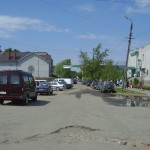 Now Vyšnij Voloček is actually my sort of place and I think I would be quite happy living there. It is a complete mess, with largely unmade roads, a scruffy but lively market and seemingly few rules and regulations about anything. I saw a couple of overgrown canals, but it must have gone downhill a long way for someone to have made the comparison with Venice.
Now Vyšnij Voloček is actually my sort of place and I think I would be quite happy living there. It is a complete mess, with largely unmade roads, a scruffy but lively market and seemingly few rules and regulations about anything. I saw a couple of overgrown canals, but it must have gone downhill a long way for someone to have made the comparison with Venice.
Tver is an entirely different matter. With a lot of fine buildings and the River Volga running through the middle of it, it has been described as being like a little St.Petersburg, and that is quite appropriate. I had a reservation in a hotel called the Seliger near the centre, and it was actually not too difficult to find. It surpassed all expectation in having no English-speaking staff, and I don't how I got past the ground-floor reception, but I eventually got to my room on the second floor. At the top of the stairs was another receptionist who gave me my key, and there were two other people whose roles were uncertain. One was an elderly man who sat near the receptionist, and the other a lady at a desk at the far end of the corridor just past my room. In Russia there seem to be quite a lot of people around in non-jobs which date back to Soviet times. There is a general rule that you should not drink the tap water in Russia. In St.Petersburg it is supposed to contain some sort of invisible bug, but in Tver the deficiencies were not invisible. When I ran the tap in my room the water came out brown, and the lavatory looked much the same after flushing as it did before. I discovered this just after having a shower.
The hotel car park was actually an independent car park at the back, run by a man who had what I could best describe as a "can't do" attitude that I came across many times in Russia, especially in older people with service jobs. His first reaction to my car appearing on his territory was to try to stop me parking there. After a bit of an argument in which I spoke English and he spoke Russian he agreed that I could park there for the night for 200r (about £5).
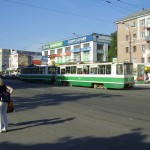 Tver is a lively and generally quite tidy town with a population of 450,000, and a comprehensive but extremely worn out public transport system. There are trams, trolley buses, buses, mini buses and taxis, but most of the trams and some of the buses are quite literally falling to pieces. It had been a long day, and after a meal and a walk round the town centre I retired early.
Tver is a lively and generally quite tidy town with a population of 450,000, and a comprehensive but extremely worn out public transport system. There are trams, trolley buses, buses, mini buses and taxis, but most of the trams and some of the buses are quite literally falling to pieces. It had been a long day, and after a meal and a walk round the town centre I retired early.
The next morning when I went out to the car I discovered the cause of the bang I had heard on the motorway. On the passenger's side of the windscreen was a star-shaped crack about 1½ inches across with traces of stone in the middle. I was concerned about this partly because I thought it might get worse with the stresses on the windscreen on the bad roads, and also because I knew I would have to pay for it, as windscreens are never normally covered by rental car insurance.
The route from Tver to my hotel on the outskirts of Moscow was just over 100 miles, and did not look too difficult on the map. It was so-called motorway almost all the way, and in my mind I thought it would take about 2 hours. In reality it turned into the most stressful drive I have ever had, with 4½ hours of dreadful traffic, and I can only say that if you are ever thinking of driving into Moscow, don't. To get to my hotel I had to take the ring road, which is very similar to the M25, and has the same sort of problems. As the M10 approached the ring road there was a massive traffic hold-up which unleashed the sort of driving that I had only seen in Albania, where people drive on every available piece of land to try to get past the stationary traffic. In one place vehicles, including a large Sprinter van, drove down a grass bank, along a narrow footpath and then scrambled back up another grass bank and pushed their way into the queue in front. Strangely, this did not seem to cause road rage.
The ring road was a nightmare, with several stretches of very slow-moving traffic caused by broken down cars (usually beaten-up old Ladas or Volgas) with people working on them in the middle of five or six lanes.
Moscow
The Tourist Hotel, which I found without too much trouble, was rather strange, consisting of seven large red brick buildings, with a small park in the middle. It had the air of a convalescent home or possibly a mental institution, and by the time I got there I was ready for either. Needless to say, there were several hurdles to be overcome before I got within sight of my room, and the can't do attitude was out in force, starting with the man in charge of the car park. Once I had convinced him that I was a guest in the hotel, and pointed out that it was the hotel car park, he agreed to let me park in return for an exorbitant fee. He sent me into the nearest building, where the receptionist said my reservation was not for that hotel. I insisted that it was, and eventually she rang someone and sent me to another building. The lady at the desk there had definitely graduated from the Rosa Klebb School of Charm with top honours and made it clear that finding me a room, registering my visa and arranging payment were extremely difficult, but she eventually produced a key. For some reason the question of payment was deferred until the evening. None of the people involved in these negotiations had any significant amount of English.
After a meal in the hotel restaurant I walked to the nearest Metro station, which took about 10 minutes, and got a train to central Moscow. The system was different from St.Petersburg, with electronic tickets which you just wave in front of a plate at the barrier, but the price was the same, 26r (about 64p) per journey, however long. Many Metro stations have two entrances a long distance apart, joined by tunnels, which makes it very difficult to know where you are when you come out. Also, there are a number of different lines, as in London, and where a station is served by two or three lines it has a different name for each line, which is rather confusing. Even more so in that each name has two formats, one Cyrillic and one Roman.
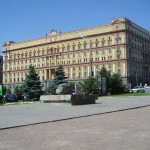 After looking at the infamous Lubyanka Prison, now the headquarters of the successor to the KGB, I walked through the central area to the Gum department store, Red Square, and St.Basil's Cathedral.
After looking at the infamous Lubyanka Prison, now the headquarters of the successor to the KGB, I walked through the central area to the Gum department store, Red Square, and St.Basil's Cathedral.
The Gum department store is massive, with a rather Harrods-like exterior extending along most of one side of Red Square and divided internally into several arcades with fabulous architecture. I suppose it would be described as a galleria, with outlets for most of the world's top names in quality goods. If Lenin came back I cannot imagine what he would say, but no doubt he would shop there.
Red Square was closed to the public for some reason that was not immediately apparent, and there were a large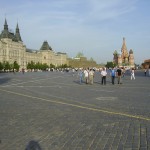 number of police manning barriers around the outside. One thing that surprised me was that Red Square is not flat, but curved, the central area being higher than the ends. Alongside and behind the magnificent St.Basil's Cathedral, at one end, there was clearly a lot of construction work in progress, and below the cathedral were some huge mounds of sand surrounded by enormous seating stands and banks of floodlights. Further investigation revealed that this was for the Red Bull International Free Style Motocross event that was being held in few days time. Now, this is hard to believe. It is equivalent to holding a motocross event in Parliament Square in London, and I cannot imagine how much money must have changed hands for it to be possible. And as for Lenin……
number of police manning barriers around the outside. One thing that surprised me was that Red Square is not flat, but curved, the central area being higher than the ends. Alongside and behind the magnificent St.Basil's Cathedral, at one end, there was clearly a lot of construction work in progress, and below the cathedral were some huge mounds of sand surrounded by enormous seating stands and banks of floodlights. Further investigation revealed that this was for the Red Bull International Free Style Motocross event that was being held in few days time. Now, this is hard to believe. It is equivalent to holding a motocross event in Parliament Square in London, and I cannot imagine how much money must have changed hands for it to be possible. And as for Lenin……
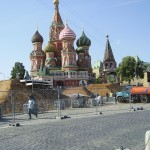 The weather was still very hot and I was consuming bottled drinks, bought from pavement vendors, at a rate almost greater than I could afford. After walking down to the bridge over the Moscow River I made my way back to the Metro and eventually the Tourist Hotel. Rosa Klebb was now in a position to organise payment for my room, and once the money was handed over she seemed much happier. It would have been interesting to find out what she thought about the St.Basil's motocross.
The weather was still very hot and I was consuming bottled drinks, bought from pavement vendors, at a rate almost greater than I could afford. After walking down to the bridge over the Moscow River I made my way back to the Metro and eventually the Tourist Hotel. Rosa Klebb was now in a position to organise payment for my room, and once the money was handed over she seemed much happier. It would have been interesting to find out what she thought about the St.Basil's motocross.
Now, most people go to Moscow to see the aforementioned sights and the Kremlin, etc., but my real aim was Lomakov's Car Museum in a suburb called Lublino. In days gone by collecting old cars would have been seen as a frivolous, capitalistic activity, and it is a sign of how much things have changed that there are now three classic car museums in Moscow, one fairly central and the other two in the suburbs.
After a thoroughly uninspiring breakfast the next morning I set off for the museums, via the Metro. Apart from anything else, I thought it would take me into areas that tourists would not normally see and I would get a better idea of the Moscow that ordinary people lived in. The first visit was to a museum called Auto-Retro, which was mainly about Russian vehicles, particularly those made in the Moscow area. On emerging from the nearby Metro station, called Ploshchad Ilycha, it was remarkably like an inner London suburb, with early 20th century buildings, shops, a small supermarket and a few kiosks selling food.
The museum surpassed all expectation, and for anyone with an interest in vehicles of the Soviet period this is the one to visit.
Next was Mr.Lomakov's museum in Lublino, an area that was very different from Ploshchad Ilycha. Around one entrance to the Metro was quite a large market, and nearby were the vast, grim blocks of flats that everyone expects to see in Russian cities. In the foreground, 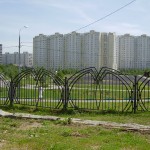 however, was a large open area with various sports facilities, and I noticed elsewhere that such buildings usually have fair-sized open spaces, often green, around them. In each building the actual condition of the flats varied greatly, some having smart double-glazed windows and others being in a totally dilapidated state.
however, was a large open area with various sports facilities, and I noticed elsewhere that such buildings usually have fair-sized open spaces, often green, around them. In each building the actual condition of the flats varied greatly, some having smart double-glazed windows and others being in a totally dilapidated state.
It was a considerable challenge to find the museum, and it turned out to be on the edge of a modern industrial/commercial area about ¼ mile away. It was a warehouse-type building, surrounded by a yard full of interesting vehicles all rusting away. The Lomakov family started collecting cars back in the Soviet days and I think the collection was kept secret for some time. An old lady took my 200r (In Russia everything seems to be 200r) and I went into the building. The contents were difficult to describe, ranging from cars and motorcycles in quite poor condition to unrecognisable lumps of rust. There was a 1937 Mercedes 540K which, even as a "barn find", would be worth a great deal of money, and a Horch in similar rough but restorable condition. Most of the vehicles were from outside the Soviet Union, which was slightly disappointing to me. When I came out I asked the old lady if I could look round the yard, but she was adamant that I could not.
I was not prepared to take no for an answer, and hung around for a couple of minutes until a man appeared in overalls. I asked him if I could look round, and he fetched another man who turned out to be Mr.Lomakov. I told him I had sent him an email from England, and with slight reluctance he agreed to take me round the yard. His English was very limited, but he had great enthusiasm for his collection as we went from rusting hulk to rusting hulk, many of which he was proposing to restore. How he was going to do that was not clear, because there were no facilities for restoration at all, and no sign of any cars that had been restored. There was a maintenance shed and a few running cars in fairly poor condition, but I got the impression that good intentions far outweighed any real achievement.
The reason for the old lady's determination not to let me wander about became apparent when we went round the back of the building and there was a large fierce dog on a long chain. For me the cars outside were more interesting than those in the museum, but sadly with the harsh Moscow winters it can only be regarded as a graveyard.
On to Autoville, in Frunzenskaya, a business and smart residential area not far from the centre of Moscow. This museum was really classy, and seemed to be aimed at the corporate entertainment market, as it was closed for a private party when I arrived. I explained that I had come all the way from England, but the man said "No, you can't come in". The theme of the collection is cars that have belonged to notable people, including Mr.Putin, but in a quick glance around I could not see any of my old cars there.
The weather was still very hot, at least 90º (32ºC), but I thought the air quality was not at all bad, certainly much better than in many large German cities under similar conditions. The reason may be that most Russian heavy industry was relocated further east as Hitler's troops approached during the war, and has remained there. Of course, I was not to know it at the time, but this was the start of a month-long period of record hot weather in Moscow, and within a couple weeks a dense smog descended on the city, partly as a result of fires in the surrounding area.
From Frunzenskaya I walked to the Moscow River, crossed over on a footbridge, and along to the next bridge through Gorky Park.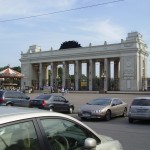 Although it was a weekday afternoon there were lots of people and children enjoying themselves, and riverside restaurants getting ready for evening visitors. It could have been anywhere in western Europe or the USA. It was a much longer walk than I had expected to the nearest Metro station, and by the time I got there I was glad to sit down on the train. Unlike London, the trains seemed to be much cooler than outside, although I don't think they are air-conditioned.
Although it was a weekday afternoon there were lots of people and children enjoying themselves, and riverside restaurants getting ready for evening visitors. It could have been anywhere in western Europe or the USA. It was a much longer walk than I had expected to the nearest Metro station, and by the time I got there I was glad to sit down on the train. Unlike London, the trains seemed to be much cooler than outside, although I don't think they are air-conditioned.
I came out of the Metro near the Kremlin Gardens, and walked from there to Lubyanka, which took me right through the city centre, leaving me with the lasting impression that there is money flowing along the streets of Moscow . What Lenin would have thought about the Bentley and Lamborghini shops within sight of the former Lubyanka Prison I cannot 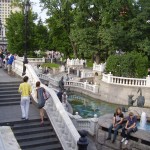 imagine.
imagine.
In the course of using the Metro I had seen a number of stations with impressive decorative features, but unfortunately I did not have time to get to the famous ones with murals or sculptures designed to inspire the workers. As previously mentioned, many of the stations have two or more entrances linked by long tunnels, and these are often lined with kiosks selling everything under the sun. They are about 10ft wide by 3 or 4 ft deep, and serve their customers through a tiny hatch in the door. There are many hundreds of them in Moscow, but their proprietors must have a pretty grim existence, stuck in there for hours every day.
Back to Tver - Breakfast in the Gulag?
The next morning, after the rush hour, I set off for Tver, where I had reserved a room at the Seliger Hotel of brown water fame. The traffic was much the same as when I came, but at least I was ready for it this time, and my nerves were rather less wracked by the time I got clear of Moscow. On the way to Tver I turned off the M10 twice, once to look at a place called Gorodnya, and later on Otrokoviči. Gorodnya had bumpy roads, a pretty church and a lake, but I did not get to Ottokoviči which was on a loop road parallel to the motorway, because after some distance the road turned to loose stones all over. A couple of local cars went flying past scattering stones everywhere, so I decided that it was not worth the risk of further damage to the Skoda and turned back.
At the Seliger I drove into the car park, and the attendant, who was rather hostile on my previous visit, came down from his little hut and greeted me warmly. He said his name was Alexander, and asked me for my name. When I told him he shook my hand, so it seemed that we were now best mates, although it didn't make any difference to the parking fee.
The weather was hotter than ever, and the evening, after a further exploration of Tver, I sat in front of a café watching people going past. The majority of people looked quite fit and well, and it was very difficult to believe that the average life expectancy in Russia is 61.5 for males and 74 for females. The low figure for males is put down to accidents, poor diet, alcoholism and, in some areas, industrial pollution. I suppose brown water doesn't help.
Accidents I can understand, seeing the road conditions, but although alcoholism is supposed to be rife in Russia, I did not see any more of it than in Britain, possibly less. In the areas I went to there was certainly no shortage of good food in the shops, but it may be that many people cannot afford it. The life expectancy figures are the average for whole country, and conditions are undoubtedly very different in the industrial areas of the Urals and Siberia. According to a respected body that monitors pollution world-wide, there is one town where the average life expectancy is only 42 for men and 47 for women due to pollution from a former chemical weapons site. This figure is denied locally.
The next morning was a wonderful example of the unrelenting problems facing the independent traveller in Russia. My hotel room faced the main east-west route through Tver and I noticed a strange lack of traffic, but thought perhaps the Russians didn't do much on Saturday mornings. The plan for the day was to drive back to Novgorod, a distance of about 225 miles, and I knew that the road out of Tver to the M10 to the north was easy to find. In due course I checked out and walked round to the car park. There was no traffic apart from a bus, with no cars parked in the street, which I thought was rather strange and on the street corner near the car park entrance was a policemen standing by his Lada. I drove straight out of the car park towards the town centre, and at the next junction was stopped by a policeman, with a car marked ANR, which is the traffic police. He came round to my window and long conversation ensued in which he spoke Russian and I spoke English. It was clear that the whole town centre area was closed to traffic and he was not going to let me proceed, but I could not understand why. I showed him my map and pointed to Novgorod, and he said something which I understood to mean that he wanted to see my visa, but I when I produced it he was not interested. Eventually I realised that he was asking for a map of Tver so that he could show me the alternative route to Novgorod, but I did not have one because I was not expecting to need it.
We were clearly getting nowhere, so I indicated that I would make a U-turn and did so, which took me right into the hands of the policeman I had seen at the previous junction. Although he must have seen what had just happened he stopped me and the process began again. After a while I suggested that I should turn right, which hopefully might take me out of the restricted area. He stood back, and I went off, only to be stopped by the policeman at the next junction. By now I was wondering what the breakfasts would be like in the gulag. After yet another meaningless discussion I drove straight to the next junction, beyond which I could see traffic moving. The policeman there stared at me, and I stared back, but he apparently had the sense to see that there was no point in stopping me, as I was leaving the restricted area. I would not give much for his chances of promotion. He actually looked a bit like Stalin.
Police
The guide books all make an issue of police corruption and the practice of stopping foreigners in the street and fining them for alleged visa irregularities. There are a very large number of police around, a lot of them quite young, and they are said to be poorly paid. The only contact I had with them was the incident above, the outcome of which was quite innocuous, but I think to a considerable extent it depends upon what you look like. In a quiet area near the centre of St.Petersburg I saw a police car screech to halt in front of a perfectly decent looking young couple of oriental appearance and the officers demanded to see their documents. All the guide books say that people of Asian or Afro-Caribbean appearance can face this kind of action, and there are in fact far fewer people of obvious ethnic minorities than in most of western Europe.
The authorities are said to be sensitive about tourists photographing public buildings or military sites. When I was stopped by the police I had a video camera mounted on the dashboard which they must have seen, but they did not comment on it.
Back to St.Petersburg
The outcome of the incident in Tver was that I was hopelessly lost and finished up joining the M10 on the south side of the city, adding well over an hour to my journey. In the traffic jam on the approach to Vyšnij Voloček I turned off and went for another look round the town, which was still in a mess and no doubt will be for a long time to come.
In Novgorod I stayed in the Intourist again, and was kept awake half the night by the sound of people driving around the town with squealing tyres. For my last night in Russia I had booked a hotel called the Katharina Hof in Pushkin, quite close to St.Petersburg airport. I took the most direct route on the M10, which left me plenty of time to make a couple of diversions to look at other places along the way. The first of these was a small town called Čudovo which must have experienced a massive downpour just before I got there, because half the streets were covered with water. It was an extremely characterless town, on the main Moscow to St.Petersburg railway line, with lots of low-rise flats, an indoor market and a sort of drinking hall in the centre.
Some distance farther along the M10 I turned off on to a road number P41 which passed a village that appeared to have a main street that was not made up at all, just mud. This part of Russia is, as I expected, rather flat, and just to emphasise that in one place on the P41 there was a speed limit of 40kph (25mph) accompanied by a steep hill sign for a gradient of 3%!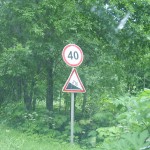
Pushkin, early on the Sunday afternoon, was a complete madhouse. It is a heavily wooded town with a number of historical buildings, the main one being the Tsar's Palace, which is quite magnificent and on a par with anything in St.Petersburg.
The Katarina Hof was, of course, extremely difficult to find, in a newly developed area on the edge of the town. It was more like a guest house than a hotel, in a residential road with nothing to show that it was anything more than a private house and I almost gave up before one of the neighbours managed to rouse someone and get the gate opened. The whole place seemed to be brand new and my initial impression was that I was the first guest that they had ever had, but there was absolutely no "can't do" attitude here, the lady in charge being really anxious to ensure that I was happy with the arrangements. When I got home I found an email from her asking me to state to arrival time of my flight and they would collect me from the airport. There were actually eight other guests, mostly German and French, and our safety was ensured by a man who seemed to live in a shed in the garden and walked around in an American-style security uniform with dark glasses, looking as if he was going to a fancy dress party.
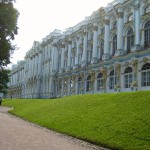 After getting sorted I went back into Pushkin, got lost in a vast park which seems to occupy most of the centre of the town, and discovered a military display with a band playing rousing music not far from the Tsar's Palace.
After getting sorted I went back into Pushkin, got lost in a vast park which seems to occupy most of the centre of the town, and discovered a military display with a band playing rousing music not far from the Tsar's Palace.
The next morning I set off for the airport and quite predictably had great difficulty in locating the Hertz base, which was in an underground car park with no signs whatsoever. It was in a big trade centre, and I could not remember where I had come out when I collected the car. The same man was there, and I showed him the crack in the windscreen, but he made no comment. However, a couple of weeks later my credit card bill came with a charge of £289 from Hertz UK for the hire and £304 from Hertz St.Petersburg for the windscreen. The trip reading on the speedometer was almost exactly 1600km (1000 miles).
It is very difficult to know what to think about Russia. There is said to be massive corruption in business and government, with increasing state control of the media, and Amnesty International says people are being tortured by the authorities. None of these things are apparent to a casual visitor, and despite the constant logistical problems I felt quite comfortable most of the time I was there. Most of the places I went to were pleasanter than I expected but it has to be remembered that I was seeing the country under very favourable weather conditions, and it might well be a different story in the winter.
The people generally seem to keep themselves to themselves in a typically north European manner, but were almost always willing to go out of their way to help when asked. Young people are very Westernised in manner and appearance, but the impression I got was that many older people have never really been able to adapt to the post-Soviet world, hence the "can't do" attitude that I came across from time to time.
On the whole trip I only encountered one Russian who was really unpleasant. I went into a building that I thought was a hotel in which I had booked a room, and just inside were three or four nice looking young ladies. I asked them if they spoke English but before they had time to reply a slightly thuggish looking man rushed in behind me and said very aggressively "What do you want?". I said I was looking for the hotel, and he said angrily "Come outside" and pointed along the road "That's the hotel, second door". It appeared that he thought I was propositioning his girls, thereby cutting out the middle man. Come to think of it, the girls actually looked a bit disappointed.